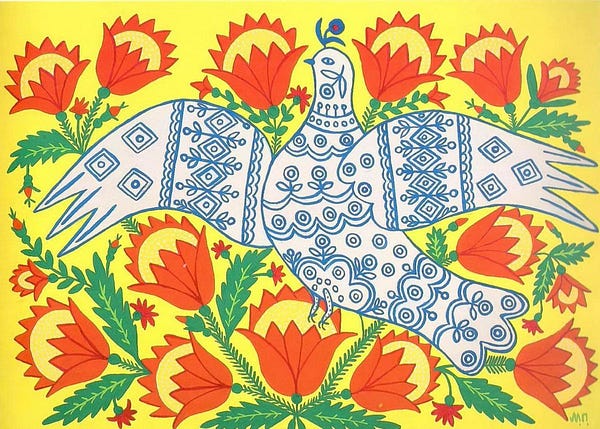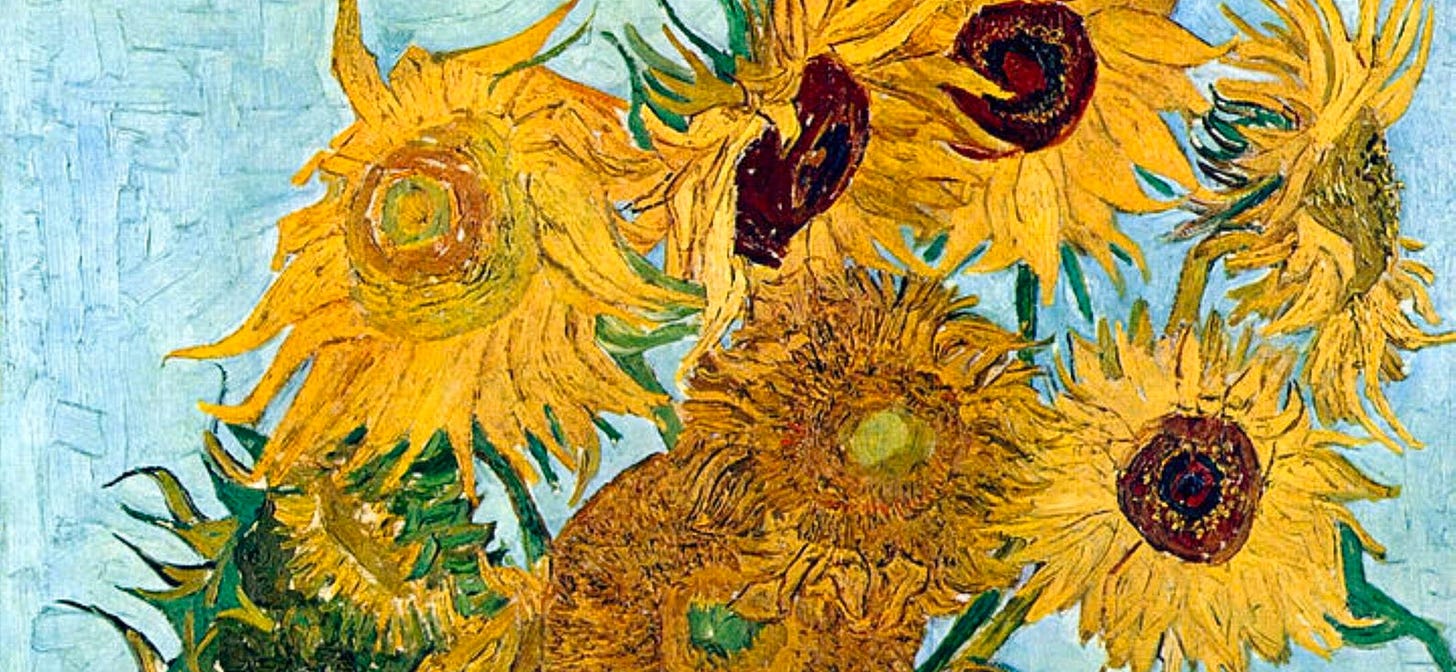Driving To Odesa On a Very Warm September Day
On the places where beauty and connection sustain us.
One very warm September, a few years after the Soviet Union fell apart, I took a cab from Kyiv seven hours south to Odesa. It is and was a glorious city that sits on the north side of the Black Sea like a grande dame.
At the Kyiv airport, a woman in a shiny grey uniform looked at my ticket and waved at me with both palms to stop me from entering the terminal. "No gas for the planes," she said, and then she pointed me to the parking lot. The Russians had raised fuel prices, a consequence of Ukraine's vote for independence from them. This wobbly new country was mired in a swamp of inflation with nyet benzine, and I needed a ride.
I found a cab driver named Viktor outside who was willing to make the trip to Odesa for American dollars and French cigarettes. He was sturdy with sandy hair and a round face. Photos of his kids were taped to his dashboard, and I took that as a sign that he wouldn't hurt a woman foolish enough to get into a car with a stranger for a ride through hundreds of miles of forested highway.
I could tell Viktor was making jokes about his car, though I couldn't understand exactly what he was saying, so I just smiled. It was a legendarily flimsy Soviet-made Zhiguli, kind of like a golf cart disguised as a Fiat. Our shoulders almost touched it was so small, but the little car huffed us out of the city and into a countryside still lush from summer. We stopped whenever there was a fuel tanker parked along the highway. Viktor would fill a Pepsi can with gas and pour it gingerly into the Zhiguli, and we'd keep going.
At one stop, he handed me meat on a stick that had been grilled by a lady next to a tanker. At the next stop, he looked up the word "embarrass" in my pocket dictionary, shook his head "no," and pointed to the field just down the embankment next to the car. I had no idea what he meant and got embarrassed thinking about the possibilities. Then he pointed to the word "urine," and I laughed. He was telling me to go pee.
I had to walk a while to get to a tree large enough to stand behind. And the minute I pulled down my pants, a cluster of skinny, irritated-looking cows walked over to stare at me. I grew up next to a farmer whose cows were much more disorganized. These cows were disturbingly coordinated. It occurred to me that Viktor could just drive away, leaving me in a field of aggressive bovines. My passport and money were strapped to my belly, but the cigarettes and my bag were in the trunk. Yet Viktor waited, leaning on the Zhiguli smoking casually like driving an American journalist across the country was an ordinary day.
After we had exhausted ourselves trying to gesture our way through a conversation about his kids and my siblings, Viktor put a cassette tape in. And that is how he and I found ourselves rolling through the Ukrainian countryside singing to Ace of Base's "All That She Wants (is another baby)."
Like everyone else during these last days, I’ve been unable to turn away from the news of the attacks on Ukraine—the babies born in shelters as missiles obliterate buildings around them, civilians trying to stop tanks with their bodies. And eerily, when I shut off the TV and took the dog for a walk yesterday, I pressed shuffle on my music, and that silly song started playing. I thought of Viktor’s three kids in that plastic-covered photo.
Viktor dropped me off in the lobby of a grand hotel in Odesa where the electricity came and went like the wind. I thanked him, but it seemed insufficient. So I bowed, and using all four of my Russian words, I said I was “embarrassed” to meet him. He got my dumb joke and cracked up. We stood there laughing for a minute, maybe because of the strangeness of it all. Then he left through the revolving doors, cigarettes under his arm.
The man behind the reception desk hand-wrote my credit card number on a piece of paper and told me there'd be hot water at 10 am. In the morning, I could see the colors of neoclassical and art nouveau buildings along the wide boulevards. Mint, robin's egg blue, salmon, pink, and cream. And they looked like they had been decorated by some mad operatic baker who frosted every edge and doorway with wild swirls and patterns. Modern Odesa was laid out opulently in the 19th century by a Frenchman, Duke de Richelieu. And the Italians showed up to build extravagant buildings alongside the French. The result is magnificent.
I had come to interview a 15-year-old figure skater who would win an Olympic gold medal for Ukraine a few months later. She practiced in a rink so under-cooled that the ice was hidden under three feet of mist. You couldn't see her feet as she spun to Tchaikovsky and “My Fair Lady,” her ponytail whipping against her cheek when she turned. Her gloved hands caressed the top of the mist like she was a child-goddess skimming the clouds. When the music stopped, you could hear the thud and scrape of her blades and the sharp "huh” of her exhalations as she landed. A reminder that she was just a flesh-and-blood girl resisting gravity and circumstance.
My translator, Bohdan, who worked for a local radio station told me that there had been a settlement in this place since the 6th century B.C. It’s no accident that Odesa's most famous landmark is a massive staircase that leads down to the sea. The steps are a symbolic entrance facing south for a city that’s been a port and trading hub for centuries, conquered and reconquered as empires rose and fell around it. Odesa was also a center for Jewish culture; many there still speak a version of Russian tinged with Yiddish rather than Ukrainian. The Jewish population was decimated by waves of persecution, but the devotion to literature, humor, and theater remained.
When I met Bohdan, he patted his very bald 27-year-old head, looked into my eyes, and said solemnly, "Chernobyl." And when I seemed stricken, thinking he had radiation-related cancer, he giggled and said no. It was his running gag to blame random misfortunes on the Chernobyl catastrophe. “Comedians,” he said, “are Odesa’s greatest export.” We went to a restaurant where women in Ancient Greek costumes danced while balancing glasses of water on their foreheads and the waiters wore glossy tuxes. When I remarked that people there seemed to have money, Bohdan leaned in and whispered: "mafia.” Adding, “not a funny joke."
Before he put me on the train to Kyiv, Bohdan told me a joke that I’ve never quite understood and never forgotten. A train conductor is announcing stops along the route and when he says, "Odesa!" people on the train say, "Odesa! Where's my luggage?" For years my family would respond to any self-made disaster with that phrase and cackle as if it made sense.
The trip North took 12 hours in a four-bunk sleeper cabin with frilly curtains and way too many people. It was easily over 90 degrees in there because nobody could figure out how to turn off the heat or open the windows. When the Bulgarian guys below me unwrapped newspapers filled with fish, boiled eggs, and tomatoes, the combination of train smells and fish almost felled me. But they shared their vodka and we sweated our way to Kyiv like it was a party.
This week, I keep thinking about that ride through a country just starting to make its way toward freedom in fits and starts. And oh, that young skater leaping into an opaque mist, believing she could hit the ice safely.
There are places in the world where both tragedy and beauty cycle through with more force and frequency than others. And today, unbearably, Ukraine's trains are filled with mothers holding disoriented, exhausted children fleeing a brutal invasion, watching their cherished cities disappear behind them.
Well hello! I’m so glad to have you. If you love It’s Not Just You, please share it or consider subscribing.
VIDEO: A walk through Odesa, Summer, 2020
It’s Not Just You is a free weekly essay, uplifting recommendations, and a community of thousands. If you love it, consider supporting my work with a paid subscription. You’ll gain access to “Dear You,” a monthly advice column and special podcast editions. Send your advice questions to: susanna.notjustyou[at]gmail.com
A POETIC DELIGHT
Alexander Pushkin on Odesa:
There for a long time skies are clear.
There, stirring, an abundant trade
sets up its sails.
There all exhales, diffuses Europe,
all glitters with the South, and brindles
with live variety.

A moment from this week, Latvians sang the Ukrainian anthem in front of the Russian embassy in Riga.

Germans singing “Where Have All the Flowers Gone?” at the Brandenburg Gate in Berlin.


Invading Russian forces destroyed a museum in Ivankiv, a city northwest of the capital Kyiv, that was home to dozens of works by the Ukrainian folk artist Maria Prymachenko on Sunday.





I can't even describe what I feel after reading this piece. If there's one word for both sorrow and beauty I wish I knew what it was.
Stunning writing. The beauty you convey contrasted with the destruction taking place now is heartbreaking.